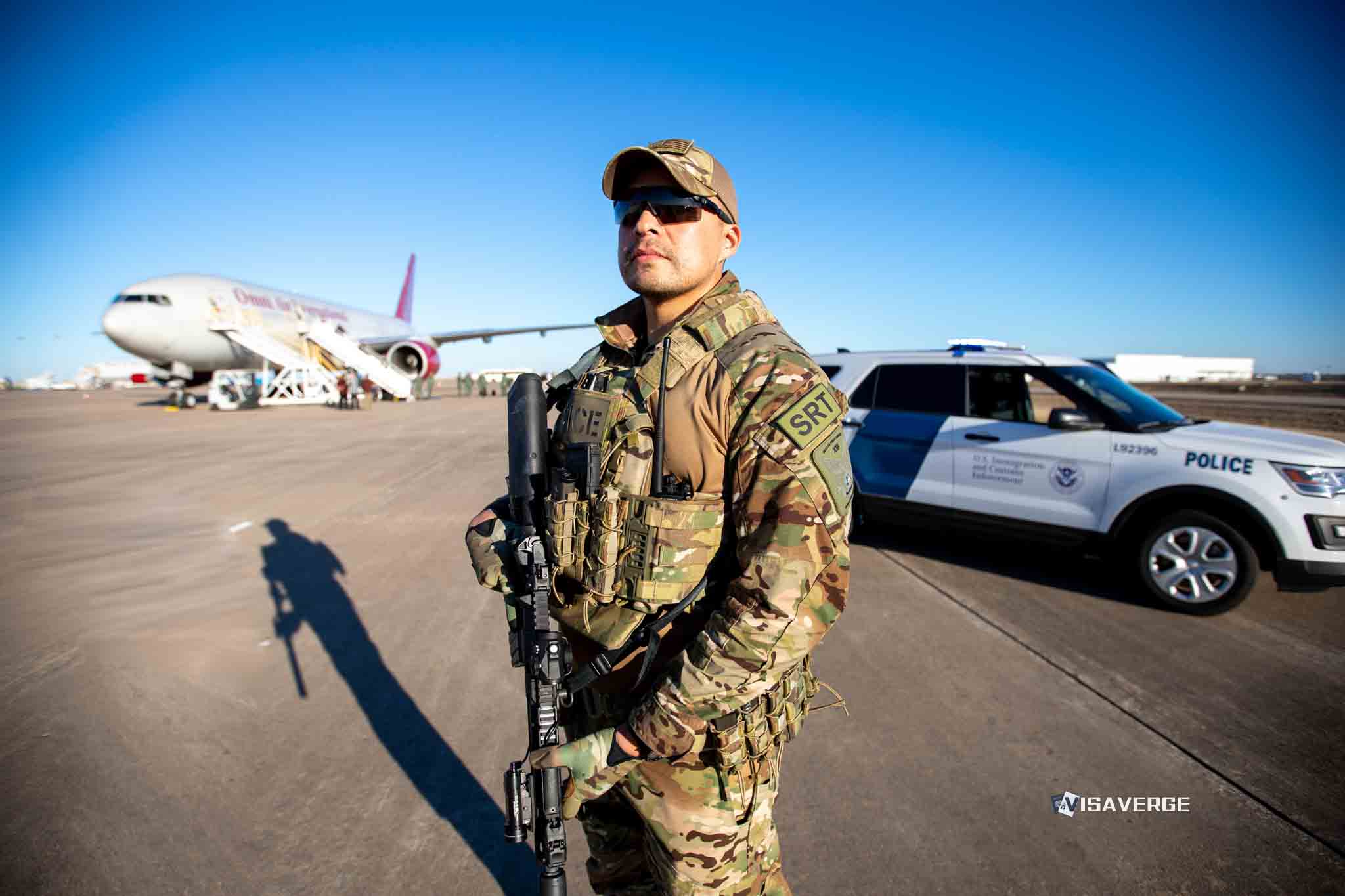Key Takeaways
• Judge Murphy ordered Trump administration to return Guatemalan asylum seeker O.C.G. deported in February 2025.
• O.C.G. was deported despite court protection, risking violence due to sexual orientation and ignored legal procedures.
• Trump policies since January 2025 increased deportations, canceled asylum appointments, and paused refugee programs.
A federal judge has ordered the United States 🇺🇸 government to bring back a Guatemalan asylum seeker who was wrongly deported earlier this year. This decision, delivered by U.S. District Judge Brian Murphy on May 23, 2025, shines a spotlight on ongoing problems in the country’s immigration system, especially under the Trump administration. The case involves a gay man from Guatemala who was sent to Mexico and then deported to Guatemala, despite clear legal protections against such actions. This article explains what happened, why it matters, and what it means for immigrants, officials, and the broader public.
Judge Orders Return of Guatemalan Asylum Seeker

Who: The person at the center of this case is known in court documents as O.C.G., a Guatemalan asylum seeker who identifies as gay and has faced violence because of his sexual orientation.
What: O.C.G. was deported from the United States 🇺🇸 to Mexico, and then from Mexico to Guatemala, even though a judge had ruled he should not be sent back to Guatemala. Judge Murphy has now ordered the Trump administration to help bring O.C.G. back to the United States 🇺🇸.
When: The wrongful deportation happened in February 2025. The court order for his return was issued on May 23, 2025.
Where: The events took place at the southern border of the United States 🇺🇸, with O.C.G. ending up in Guatemala.
Why: The deportation violated both U.S. law and international agreements that protect people from being sent to countries where they face serious harm.
How: Judge Murphy found that immigration officials ignored court orders, failed to ask O.C.G. about his fears, and gave false information to the court.
What Happened to O.C.G.?
O.C.G. came to the United States 🇺🇸 seeking asylum, which is protection given to people who fear harm in their home countries. He showed proof that he had suffered violence in Guatemala because he is gay. An immigration judge agreed that he should not be sent back to Guatemala.
However, just two days after getting this protection, U.S. immigration officials put O.C.G. on a bus to Mexico without warning. In Mexico, he was again at risk. He had already been assaulted and kidnapped there before. Mexican officials then deported him to Guatemala, where he now lives in hiding, afraid for his life.
O.C.G. told the court, “I wear hats and attempt to blend in so that no one recognizes me or sees that I have returned. Living a normal life is impossible here.”
Legal Problems and Judge’s Findings
Judge Murphy’s ruling pointed out several serious mistakes and violations by the Trump administration:
- No Chance to Speak Up: O.C.G. was not allowed to explain his fears of torture or persecution before being sent to Mexico.
- Ignoring Court Orders: Immigration officials deported him even though a judge had said he could not be sent to Guatemala.
- No Access to a Lawyer: O.C.G. asked to talk to his lawyer but was denied.
- False Information: The Trump administration told the court that O.C.G. had been asked about his fears and had not raised any concerns. Later, government lawyers admitted they could not find any official who remembered talking to him.
Judge Murphy was clear in his criticism, saying, “The Court was misled with false information, which it relied upon, to the detriment of an individual facing significant and irreversible harm.”
He also noted that the Department of Homeland Security (DHS) made things worse by revealing O.C.G.’s full name in public court records, even though the court had ordered them not to.
What Happens Next for O.C.G.?
The Trump administration must now arrange for O.C.G. to return to the United States 🇺🇸. O.C.G. has said he is afraid to leave his home in Guatemala, but travel is possible. His lawyers have suggested that a charter flight could be organized if the government helps.
Judge Murphy said that bringing O.C.G. back would cost very little and is necessary to keep the country’s promises. He wrote, “The public benefits from residing in a country where laws are upheld and promises are honored.”
Policy Changes Under the Trump Administration
This case comes at a time when the United States 🇺🇸 has made big changes to its immigration policies since President Trump began his second term in January 2025. These changes have made it harder for people to seek asylum and have led to more people being sent to other countries while they wait for their cases.
Key Policy Changes
- National Emergency at the Border: On January 20, 2025, President Trump declared a national emergency at the southern border.
- “Remain in Mexico” Returns: The administration brought back the “Remain in Mexico” program, which means most asylum seekers must wait in Mexico for their U.S. court hearings.
- Refugee Program Suspended: The U.S. Refugee Admissions Program (USRAP) has been paused since January 22, 2025. No new refugees are being processed.
- Welcome Corps Ended: The Welcome Corps, a program that helped refugees resettle, was stopped in February 2025.
- Asylum Appointments Canceled: About 270,000 pending asylum appointments were canceled, and the CBP One app was shut down and replaced with CBP Home.
These changes have made it much harder for people fleeing danger to find safety in the United States 🇺🇸.
Legal Challenges
Many of these new policies are being challenged in court:
- Pacito v. Trump: This lawsuit challenges the pause of the refugee program and the loss of funding for resettlement.
- Birthright Citizenship: Several lawsuits are fighting an executive order that tries to change who can become a citizen by birth.
- Deportation Practices: Judge Murphy’s order in O.C.G.’s case is part of a growing number of court decisions questioning how the Trump administration is handling deportations, especially when people are sent to third countries without a fair process.
Why This Case Matters
The case of O.C.G. is important for several reasons:
- Due Process: It shows that people seeking asylum are sometimes not given a fair chance to explain their fears before being deported.
- Government Accountability: The judge found that officials gave false information to the court, raising questions about honesty and responsibility.
- Safety of Asylum Seekers: The case highlights the dangers faced by people sent to countries where they are not safe, especially those who are LGBTQ+ or have other vulnerabilities.
- Legal Precedent: The court’s decision could affect how similar cases are handled in the future, making it clear that the United States 🇺🇸 must follow its own laws and international agreements.
The Human Impact
For O.C.G., the stakes are life and death. He has already suffered violence in both Guatemala and Mexico because of his sexual orientation. Now, he lives in fear, unable to live a normal life.
The judge rejected government claims that O.C.G. was not in real danger, saying he risks not only death but also the loss of “all that makes life meaningful.”
This case is not unique. It is the third time the Trump administration has been ordered to bring back someone who was wrongly deported. Each case raises serious questions about how the system treats people who are most at risk.
Background: Safe Third Country Agreements
The United States 🇺🇸 has agreements with some countries, like Guatemala, that are supposed to make them “safe third countries.” This means that people passing through these countries must ask for asylum there instead of in the United States 🇺🇸.
But many experts and advocates say these countries are not truly safe for everyone. For example, former U.S. Ambassador to Guatemala Stephen McFarland has said that Guatemala does not have the resources to protect large numbers of asylum seekers. People fleeing violence from other countries may still be in danger in Guatemala.
The case of O.C.G. shows that sending people to countries like Mexico or Guatemala can put them at serious risk, especially if they are part of groups that face extra danger, like LGBTQ+ individuals.
What Does This Mean for Stakeholders?
For Asylum Seekers
- Increased Risk: People seeking safety may be sent to countries where they are not protected.
- Uncertainty: Changes in policy and court decisions can make it hard to know what will happen next.
- Need for Legal Help: It is more important than ever for asylum seekers to have access to lawyers and to know their rights.
For Government Officials
- Legal Responsibility: Officials must follow court orders and make sure people are not sent to places where they face harm.
- Transparency: Giving false information to courts can have serious consequences.
- Policy Review: The government may need to review how it handles deportations and asylum claims to avoid future legal problems.
For the Public
- Rule of Law: The case reminds everyone that the United States 🇺🇸 is supposed to be a country where laws are followed and promises are kept.
- Moral Questions: The treatment of vulnerable people, like O.C.G., raises questions about the country’s values and commitments.
Practical Guidance for Affected Individuals
If you or someone you know is seeking asylum in the United States 🇺🇸, here are some important steps:
- Know Your Rights: You have the right to explain your fears before being deported. If you are afraid of being sent to another country, tell officials clearly and ask to speak to a lawyer.
- Get Legal Help: Contact a trusted immigration attorney or a nonprofit organization that helps asylum seekers.
- Keep Records: Save copies of all documents and write down what happens during your case.
- Stay Informed: Immigration policies can change quickly. Check official sources like the U.S. Citizenship and Immigration Services (USCIS) Asylum page for the latest information.
Looking Ahead
The Trump administration’s response to Judge Murphy’s order will be closely watched. How the government handles O.C.G.’s return could set important rules for future cases. It may also influence how courts and officials treat other people who are wrongly deported or denied a fair process.
As reported by VisaVerge.com, this case highlights the need for clear rules and honest actions in the immigration system. It also shows the real-life impact of policy changes on people who are simply trying to find safety.
Conclusion
The story of O.C.G., the Guatemalan asylum seeker, is a powerful reminder of the challenges facing the United States 🇺🇸 immigration system today. It shows what can happen when rules are not followed and when people are not given a fair chance to explain their fears. The court’s order to bring O.C.G. back is not just about one person—it is about making sure the country keeps its promises and protects those who need help most.
For anyone affected by these issues, staying informed and seeking legal help are the best ways to protect your rights. The outcome of this case will likely shape how similar situations are handled in the future, making it an important moment for everyone involved in the immigration process.
Learn Today
Asylum Seeker → A person seeking protection from persecution or harm in their home country by requesting asylum elsewhere.
Deportation → The forced removal of a person from a country, usually for immigration violations or legal reasons.
Remain in Mexico → A policy requiring asylum seekers to wait in Mexico during their U.S. immigration court proceedings.
Safe Third Country → An agreement where asylum seekers must seek protection in a third country considered safe before reaching the U.S.
Due Process → Legal principle ensuring fair treatment through the normal judicial system, especially protection of individual rights.
This Article in a Nutshell
A federal judge ordered the Trump administration to return O.C.G., a gay Guatemalan asylum seeker deported illegally. This highlights systemic immigration failures and risks faced by vulnerable asylum seekers, underscoring urgent need for legal protections and government accountability amid harsh new policies.
— By VisaVerge.com













